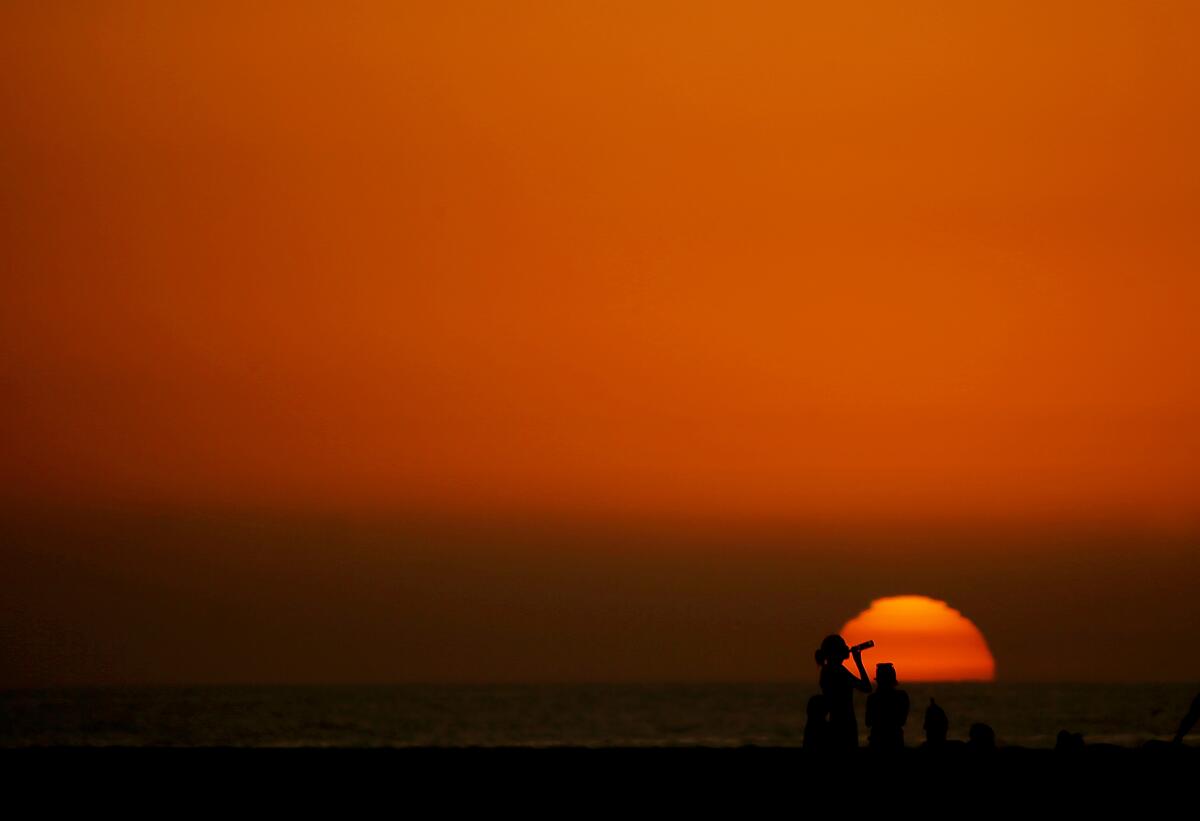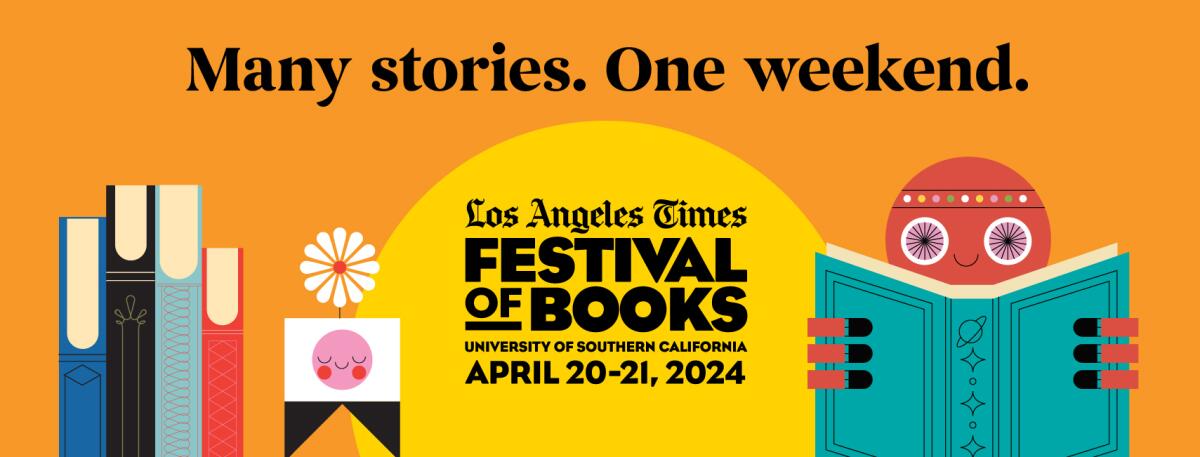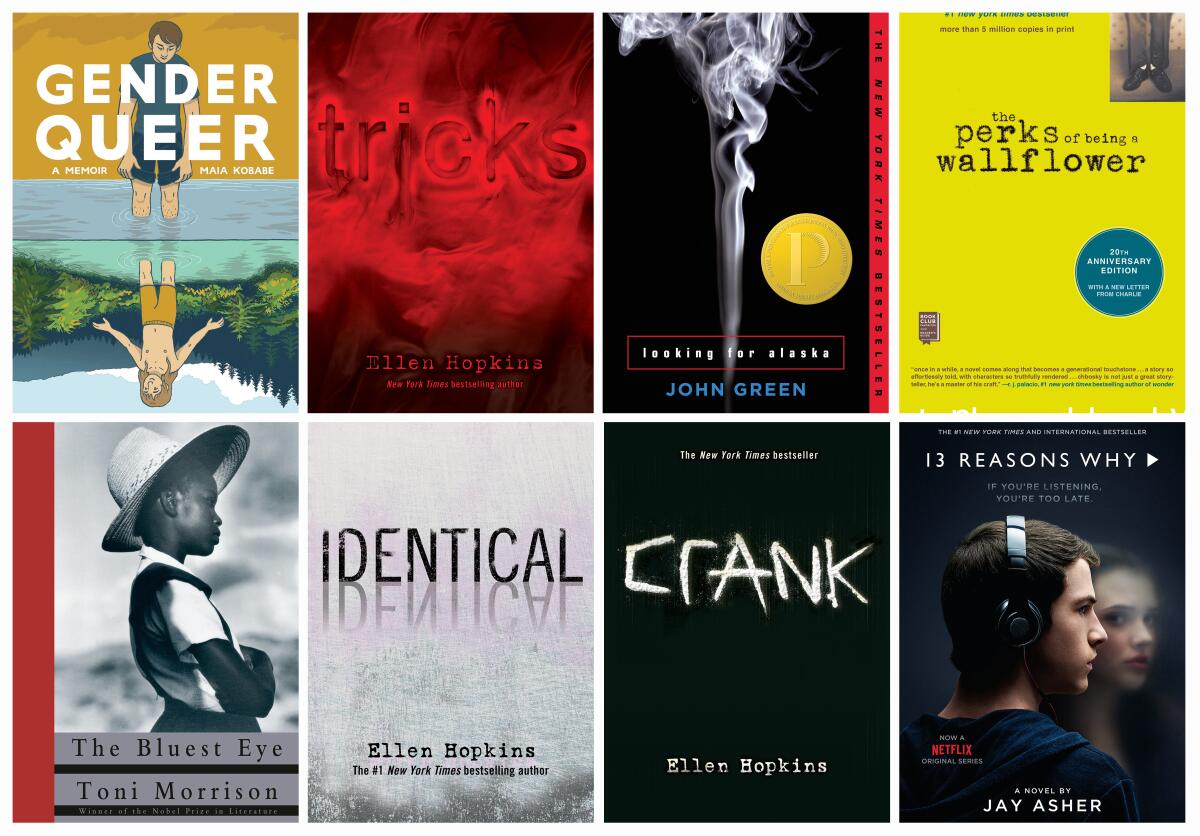Worried about climate change? Read these women authors

The defining issue of our time, and more in this week’s Book Club newsletter.
You’re reading Book Club
An exclusive look at what we’re reading, book club events and our latest author interviews.
You may occasionally receive promotional content from the Los Angeles Times.
Good morning and welcome back to the L.A. Times Book Club newsletter.
For the next few editions of the newsletter, you’ll be hearing directly from authors. Next up …
I’m Lorraine Berry, a frequent contributor to The Times’ books coverage.
For as long as we can remember, most of us who grew up in the West have been aware of the environmental issues we face, including water rights, grazing rights, wilderness preservation, forest fires, drought and endangered species. But these issues have never felt more pressing.
Climate change’s impact on water supplies, forest firestorms and air quality have been front and center for many of us.
I’ve immersed myself for the last few years in the books that consider our collective future. I’ve especially resonated with the novels, memoirs and studies written by women. After all, part of choosing whether to have children is also a decision about the future. Other factors in the climate crisis — the inequality of its impact based on structural issues of race, class, gender and mobility — has created a complex ecosystem in which to grow such creative work.
Recent books by Camille T. Dungy, Lydia Millet, Emily Raboteau, Elizabeth Rush, Manjula Martin, and many others have looked specifically at these questions about climate change’s impact on women.
Here are some books by female writers that offer more insight on climate change and the environment.
(Please note: The Times may earn a commission through links to Bookshop.org, whose fees support independent bookstores.)
“The Light Eaters” by Zöe Schlanger
The Atlantic staff writer examines the role of plants in climate change and the secrets they hold. Increasingly, scientists have turned their research to investigating whether plants can teach us their strategies for survival.
“You Are Here” by Ada Limón
Limón, the U.S. poet laureate, edited a collection of poetry by authors in conversation with the natural world. The collection appears in April. It’s a lovely book to take with you to read at the end of your next hike.
“Dispersals” by Jessica J. Lee
In this collection of essays, Lee reflects upon human interactions with nature by examining terms we use in our gardens like “invasive” and “weeds.” It’s a terrific work on how borders work to keep both people and plants separated.
“Lessons From the Climate Anxiety Counseling Booth” by Kate Schapira
Schapira brings years of knowledge gleaned from conversations about people’s concerns in “Lessons From the Climate Anxiety Counseling Booth.” It provides advice on how to deal with the increasing sense of dread many feel in our uncertain climate times.
“Medicine Wheel for the Planet” by Dr. Jennifer Grenz
Grenz is an Indigenous ecologist and scholar whose guidebook offers advice to those seeking a holistic approach to restoring the earth, advocating for a purposeful, reciprocal interaction with the environment. Drawing from both her own scientific research and the Indigenous worldview, Grenz creates a new path forward.
“The Age of Loneliness” from Laura Marris
This collection of essays is dedicated to understanding periods of loneliness and alienation and times when we feel connected and harvest the abundance around us. In recounting periods of ecological loss and recovery, she provides solace to those who feel alone right now.
The L.A. Times Festival of Books has a ton of climate-related talks
The Times Book Club author for April is Abraham Verghese, Stanford medical professor and author of the highly-acclaimed epic novel, “The Covenant of Water.” The Book Club discussion will be one of the featured events at the Los Angeles Times Festival of Books, which will run April 20-21 on the USC campus. Ticket packages for these and other special events are available now.
At the L.A. Times Festival of Books, several panels will explore and interrogate our changing planet. Many of these events are free, but require tickets in advance. Ticket information is available here.
Ask a Reporter: Our Climate Change Challenge
Join reporters Russ Mitchell, Rosanna Xia and Sammy Roth in an audience Q&A on issues related to climate change.
Saturday, April 20, 11:45 a.m.
Mudd Hall 203
Science: Climate Change Isn’t Fiction, Presented by Getty PST Art
Sammy Roth leads panelists who will look at how the stuff of dystopian novels is our new reality. Join panelists Jeff Goodell, Dan Egan, Edward Humes and Rosanna Xia, who will offer helpful, actionable ideas about hopeful living in a world on fire.
Saturday, April 20, 3:30 p.m.
Seeley G. Mudd 124
Turf War: When Wildlife and Cities Collide
Peter S. Alagona, Ben Goldfarb, Beth Pratt, Rae Wynn-Grant and Louis Sahagún examine our capacity for creating a more livable world not just for ourselves, but our animal friends who live alongside us.
Saturday, April 20 3:00 PM
Seeley G. Mudd 123
Ask a Reporter: Cali of the Wild
L.A. Times reporters Corinne Purtill, Louis Sahagún and Lila Seidman participate in an audience Q&A on California wildlife and environmental challenges.
Sunday, April 21, 10:00 a.m.
Mudd Hall 203
Mother Nature: Women and Wilderness
Authors Angie Sijun Lou, Melissa Sevigny, Diane Smith, Karen Tei Yamashita and Denise Hamilton challenge notions of conquering nature in their approach to covering the natural world.
Sunday, April 21 11:00 a.m.
Albert and Dana Broccoli Theatre
Placemaking and the Politics of Land
This provocative panel will explore placemaking and the land that we share. Drawing from California’s wine country, the Panama Canal, Owens Lake and the L.A. River, panelists will look at issues related to labor, race, gender, sustainability and more. The panelists will be Joan Flores-Villalobos, Julia Ornelas-Higdon and Alexander Robinson. William Deverell will moderate.
Sunday, April 21, 12:00 p.m.
Wallis Annenberg Hall Presented by USC
Humans vs. Nature: Conflict with the Natural World
Panelists Andrea Lankford, Christina Gerhardt and Will Cockrell, along with moderator Thomas Curwen answer questions like how do we meaningfully interact with and explore the world in a way that benefits both humanity and nature?
Sunday, April 21, 2:00 p.m.
Albert and Dana Broccoli Theatre
The Week(s) in Books
California saw an increased number of books — 98 — that right-wingers tried to ban, Axios reported. Top of the list in California were the books “Gender Queer: A Memoir” and “Beyond Magenta.” Books featuring LGTBQ themes have been the focus of many of these attacks. Donna Wares wrote about book bans for this newsletter back in September.
The National Book Critics Circle announced its 2023 awards in the categories of fiction, nonfiction, biography, autobiography, poetry and criticism. Judy Blume was awarded the Ivan Sandrof Lifetime Achievement Award. L.A. Times Book Prize nominee “We Were Once a Family” also won in nonfiction. See the full list here.
Local author Myriam J.A. Chancy, who is chair of the humanities at Scripps College, launches her newest book, “Village Weaver,” in an event sponsored by the Beyond Baroque Literary Arts Center in Venice. She will be appearing April 5 in conversation with Talia Lakshmi Kolluri, author of “What We Fed to the Manticore.”
Vroman’s Bookstore hosts Simone Gorrindo in conversation with Cynthia D’Aprix Sweeney on April 12. Gorrindo’s April debut, “The Wives,” is her memoir about life as the spouse of a member of an Army Special Forces unit.
Vroman’s Hastings Ranch location will close in May.
Bookstore faves

Every couple of weeks, we ask an L.A. bookseller what they’re selling and what they’re loving. This time, it’s Jennifer Caspar, founder of Culver City’s Village Well Bookstore and Coffee.
We asked Caspar what was catching readers’ attention at the store, and whether climate change books were drawing an audience.
Here’s what she wrote back ( edited for length and clarity):
We have two excellent new releases this week that are striking nerves: First, Percival Everett’s “James,” which is a retelling of the Huckleberry Finn story from the perspective of Huck’s enslaved companion Jim. Everett is riding a tide of recognition he got from the adaptation of his book “Erasure,” which [was made] into the film “American Fiction” and took the Oscar for adapted screenplay.
The second is Hanif Abdurraqib’s “There’s Always This Year,” the author’s latest work of cultural criticism, this time on the game of basketball. No matter what he’s writing about, Abdurraqib’s language is like poetry and his insights draw the magic out of a subject.
It’s so great to see two excellent writers finding audiences in this moment.
We’ve also had multiple inquiries this week about the “Trump Indictments” and James McBride’s “The Heaven & Earth Grocery Store,” which has been selling well since fall.
In terms of climate change, we’re selling lots of books that address this.
With Netflix’s release of “3 Body Problem,” we’ve seen sales spike of that, as well as Rachel Carson’s “Silent Spring,” which gets mentioned in the show. It came out in 1962 and warned about the dangers of pesticide use and humanity’s collective negative impact on its own future.
We have sold a lot more fiction than nonfiction books on climate change, with “The Overstory” by Richard Powers, Octavia Butler’s prescient classic “Parable of the Sower” and Booker Prize winner Eleanor Catton’s “Birnam Wood,” which just came out in paperback, currently leading our fiction list.
In terms of nonfiction, our bestsellers and the ones we like best have been:
- “California Against the Sea” by Rosanna Xia. That book won the California Independent Bookseller’s Alliance (CALIBA)’s 2023 award in the nonfiction category.
- “The Heat Will Kill You First” by Jeff Goodell, which our new Environmentalist book club read for its inaugural meeting in January this year.
- Naomi Klein’s 2014 bestseller “This Changes Everything.”
Sign up for our Book Club newsletter
Get the latest news, events and more from the Los Angeles Times Book Club, and help us get L.A. reading and talking.
You may occasionally receive promotional content from the Los Angeles Times.





